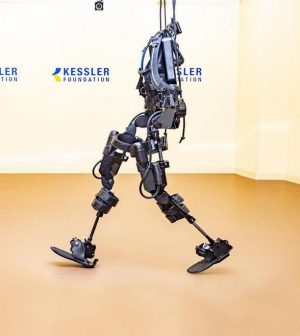- Recognizing the Signs of Hypothyroidism
- 10 Strategies to Overcome Insomnia
- Could Artificial Sweeteners Be Aging the Brain Faster?
- Techniques for Soothing Your Nervous System
- Does the Water in Your House Smell Funny? Here’s Why
- Can a Daily Dose of Apple Cider Vinegar Actually Aid Weight Loss?
- 6 Health Beverages That Can Actually Spike Your Blood Sugar
- Treatment Options for Social Anxiety Disorder
- Understanding the Connection Between Anxiety and Depression
- How Daily Prunes Can Influence Cholesterol and Inflammation
High-Tech Exoskeletons Improve Bowel Function in People With Spinal Cord Injury

Digestive issues are common after spinal cord injury and can lead to chronic constipation and incontinence. But robotic exoskeleton-assisted walking can improve matters in people with such injuries, researchers say.
In an earlier survey, more than a third of men with spinal cord injury said bowel and bladder problems had the most significant effect on their lives after their injury.
Treatment has traditionally involved targeting the gastrointestinal system, but recent research suggested physical activity and upright posture may improve colon function.
This study examined whether placing a person with a spinal cord injury in a robotic exoskeleton suit that enables them to stand and walk may help.
It included 49 patients who completed 36 sessions of exoskeleton-assisted walking. Results showed that it provided some improvement in digestive function.
“We saw a notable reduction in bowel evacuation time, with 24% of participants reporting an improved experience,” study co-author Gail Forrest, director of the Kessler Foundation’s Tim and Caroline Reynolds Center for Spinal Stimulation in New Jersey.
The findings supported the hypothesis that “this intervention may improve several measures of bowel function,” Forrest said in a foundation news release.
Study co-author Dr. Peter Gorman said the findings support the idea that walking, and not just standing, may have a beneficial effect.
“Our goal is to improve the quality of life of those with chronic spinal cord injury, and these encouraging results will help inform future studies on the emerging field of mobility intervention,” said Gorman, chief of the Division of Rehabilitation Medicine at the University of Maryland Rehabilitation and Orthopaedic Institute.
The findings were published recently in the Journal of Clinical Medicine.
More information
The U.S. National Institute of Neurological Disorders and Stroke has more on spinal cord injury.
SOURCE: Kessler Foundation, news release, May 28, 2021
Source: HealthDay
Copyright © 2026 HealthDay. All rights reserved.










